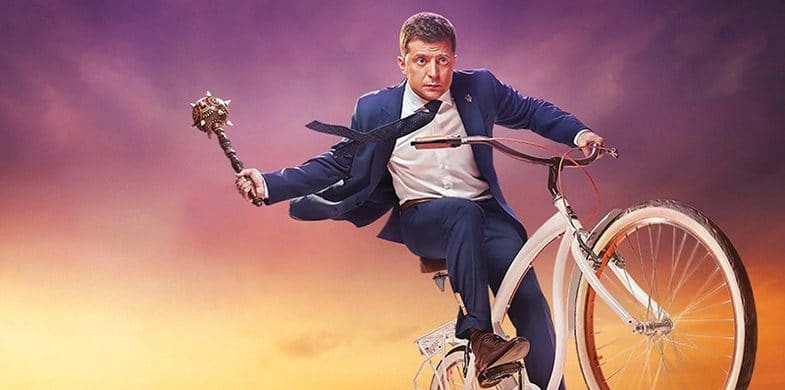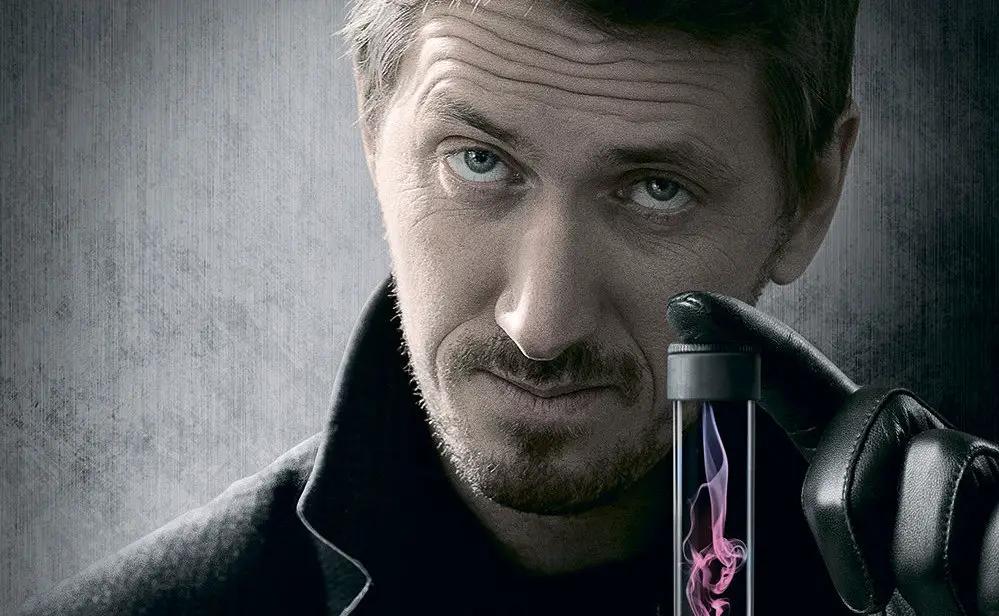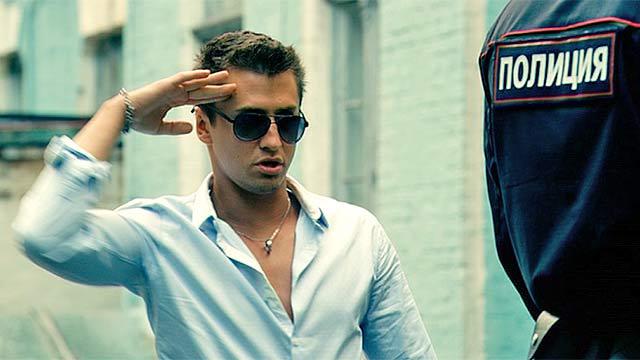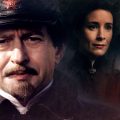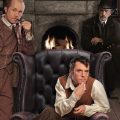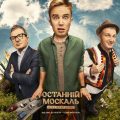Servant of the People (Слуга народу) is a Ukrainian political satire comedy TV show, produced by Kvartal 95 Studio and directed by Alexey Kiryushchenko. The premier of the first season was released on November 16, 2015, on the Ukrainian TV channel 1 + 1. As if it was predicting a political phenomenon that will actually happen years later, the show tells the story of Vasyl Petrovych Holoborodko, an ordinary high school teacher who, through the power of social media, became the President of Ukraine.
Holoborodko is played by Volodymyr Zelensky, who, in fact, ran for presidency and was elected in April 2019 under a party called “Servant of the People” created by his very own company Kvartal 95.
After the latest episode was released on March 28, roughly a month before the election, the show is currently on hiatus with 51 episodes over 3 seasons. A new season is not to be expected for at least five years, as the star (and much of the production staff) will be running Ukraine for the current presidential term. Zelensky has also said that he will “step away” from his production companies while president so as to avoid any conflict of interest due to business ties. All show’s episodes are available for free on YouTube and Netflix subscriptions in some countries. The show was the first Ukrainian-produced show to be purchased by Netflix.
Below, you will find the series premier, a synopsis of the first episode and a brief analysis of the series and its critical reception.
Watch the series premier:
For more information, as well as the full series available for free, check out the show’s official site.
You can also find the full series on YouTube. (English subtitles available for Season 1)
You can also find the first season on Netflix. (English subtitles available for Season 1)
Synopsis of First Episode
The series begins with a conversation about an upcoming election among three Ukrainian oligarchs: Andrei Nikolaevich, Mikhail Semenovich, and Rustem Mamatov, while they look down at Kyiv’s Independence Square. It is a week before election day. They have each backed their own candidates, essentially controlling the election through spending, and now all three are running neck and neck. They make a bet to now step away from the campaigning and see “who is the real king of the mountain” – that is, whose candidate can come in first without further assistance from the oligarchs.
The scene cuts to the protagonist’s father, Peter Vasylich Holoborodko, walking out of his apartment and getting into an argument with a young man who has parked so that his car has blocked the exit. The landlord tells Peter not to look for trouble because the young man’s father is someone powerful. Peter gets angry and asks the landlord to finally build a parking lot.
Upstairs, his son, Vasyl Petrovych Holoborodko, oversleeps. He rushes to get ready, arguing with his family who shares the apartment. He is shown using the toilet while reading a magazine that features Yuriy Ivanovich Chuiko, the Ukrainian Prime Minister, on its cover. When he emerges from the toilet, he is by the Prime Minister, who addresses him as Mr. President.
In one of the cars in the presidential motorcade are Chuiko and Holoborodko, who clearly feels uncomfortable with his new title. In a flashback, Holoborodko is giving one of his students a D during his history class. Another teacher walks into the room and cancels the class, telling the students to assemble voting booths and hang up political platforms for the upcoming election. Infuriated that his class has been selected for this, Holoborodko launches into a foul-mouthed criticism of the government, its priorities, corruption, and incompetence. At one point, he claims that if given one week in office, he can show them what is to be done. Unbeknownst to either teacher, a student is filming this entire incident from afar.
Back in the car, Chuiko gives Holoborodko a brief description of his schedule for the day, which is to consist of a makeover, a photoshoot, and then a hand printing and foot printing. Amidst the frivolity, another flashback shows the student who recorded the video earlier being beaten by his classmates. He has posted the video online, and other students are afraid that there will be consequences for Holoborodko, a favorite teacher. After everyone calms down, the class tells Holoborodko that if he is actually to register, their parents will vote for him. As he is about to begin his lecture, he is called to the principal’s office.
Back in the present and again in the car, Holoborodko remembers what he had planned to that day. It is his niece’s, Natasha Sakhno, birthday, and he needs to by a present. He also has a faculty meeting at school and must make payment on his loan at the bank. So, the motorcade heads to the bank. There is a long line, but the customers there recognize him and let him cut the line to pay first. He is told that he “won the bank’s lottery” and his loan is fully paid off. The teller insists that it has nothing to do with him being the president. After he leaves, it is revealed that Choiko had engineered the entire situation and that everyone in line were state employees who had been paid to be there.
The next stop is the school. He is already late to the meeting. Before Holoborodko enters the room, he remembers the last time he was called in here. A flashback shows that the principal is very unhappy with the video. She berates him in front of the other faculty members.
Back in the present, Holoborodko walks in, afraid that his boss will berate him again. However, the faculty throws him a celebration and his boss shows him with compliments. As he is leaving, his students from class 10B run out and surround him. They say that they will become good students to match his presidential status.
At the apartment, Peter, the father, is continuously on calls with friends and relatives who want to congratulate Holoborodko. Overjoyed, Peter promises to appoint several of them into office, as he obviously believes he is filled with power now that he is so closely connected to the president. When he leaves to buy peas for his wife (and Holoborodko’s mother), Maria Holoborodko, Maria also gets a call. Although she has teased Peter’s jubilance, she also cannot hold in here excitement and promises to get her friend’s child into the prestigious Mohyla Academy. Outside, several workers have suddenly appeared to renovate the courtyard. The landlord as a police officer say that the young man with whom Peter had earlier fought with had been forced to move out.
In the car, Holoborodko again gets reminded of his niece’s birthday and asks Chuiko to get her a cake and CD by an artist named Dzidzio, who Chuiko has obviously never heard of. At the press conference, journalists bombard him with questions full of technical terms. He answers them by reading the responses off of a script that officials have already prepared for him.
Meanwhile, the three oligarchs are watching this press conference live while having a very fancy meal together. One turns the TV off, and they start talking. Each of them suspects the other to have backed Holoborodko behind the scenes, and if it is not any of them, they are convinced it has to be a foreign intervention. One of them makes a call, demanding to get every piece of information about Holoborodko.
At the press conference, Holoborodko can no longer pretend. He frankly apologizes to the journalists for not being prepared. He proposes that he will do his homework, and they will have a second press conference. Yana Klymenko, a journalist from Transparent Government Magazine, then asks how he got two million hryvnia (about $90,000 when the episode first aired) to register his candidacy. As an ordinary high school teacher, his pay from the state is very poor. Her question is has not been pre-approved and Chuiko tries to shut her down, but Holoborodko is willing to answer.
A flashback shows him having a conversation about the cost with his students. They tell him that they have crowdsourced the funds online. Back in the car, Chuiko praises Holoborodko for coming up with crowdfunding as the answer and does not believe Holoborodko when he says it was truth. Another flashback then shows the students giving him a bag with the two million hryvnias.
Holoborodko arrives home and finds his family dreamily, happily waiting for him at the dining table. He is trying to make Natasha the birthday girl the focus of the conversation, but the family keeps talking about him. Chuiko arrives, telling Natasha that he could not find her the Dzidzio CD, but he is giving her an alternative, on behalf of the Ukrainian President. A giant cake is brought in from which the lead singer from Dzidzio bursts out. The other bands members appear and the family gets a private concert as the episode ends.
Analysis of Series
Servant of the People as a series seems to provoke either strong praise or strong criticism. Few are left neutral about the show.
Anthony Kao from the Cinema Escapist gave a lot of positive feedback to this series in his article “Ukraine’s “Servant of the People” Is a Hidden Gem of Political Comedy.“He says, “While the show was made primarily for Ukrainians, its humor remains quite universal.”He concludes by saying that “Beyond high production quality and a solid story, maybe what makes Servant of the People so worth watching is how it embodies the hopes and fears of an entire nation…As they wait, Servant of the Peoplehelps them glimpse an alternate world, one that they can laugh and dream about.”
On the other side of the coin, political analyst Valery Maydanyuk, along with Professor Larisa Masenko of the Ukrainian Language Department of the Kiev-Mohyla Academy, journalist Tatyana Kuzminchuk, and others, criticize the show for its extensive use of Russian language over Ukrainian by politicians in official events, which they interpret as “language schizophrenia.” The show is mostly in Russian, with some Ukrainian dialogue, and obviously assumes its viewers are bilingual. “The Ukrainian language and culture are depicted as a kind of marginal Aboriginal folklore against the Russian language,” Maydanyuk said.
Language issues also affected the third season of the show, in which children with disabilities are referred to with derogatory slurs by some characters. First Vice Speaker of the Verkhovna Rada of Ukraine Iryna Gerashchenko stated that she and her colleagues had prepared a number of requests to open a criminal case on discrimination against people with special needs, incitement to hostility, and hatred towards people with special needs. However, two days later, the authors of the TV series apologized, claiming they “in no way wanted to offend people with special needs or their relatives.”
The major criticism now is that many see the series as having been one big political campaign. The Committee of Voters of Ukraine demanded Zelensky pay for the broadcast of the third season of the TV series as a political advertisement. It premiered just days before the first round of voting in the presidential election. Many politicians and public comments have also complained that Kvartal 95 used the series as a presidential campaign.
Journalist Vadim Yerchenko wrote “[Servant of the People] exists outside the generally accepted genres. This is not a comedy because after 2013, many jokes are not funny. It is not a sitcom, because the first 4-5 episodes merge into one prolonged scene, which has no end… It is not a political satire because it is too frank and almost names names.”
However, it is fact that the series was widely watched and got very good ratings. The first episode was named the highest-rated TV product of Ukraine’s fall season. In total, about gained about 20 million viewers in Ukraine and had some 95 million unique watchers on YouTube. It received a 7/10 on IMDb and 93% likes by Google users. It won the Best Featured TV Series and Best Producer awards by Teletriumph and was nominated for Seoul International Drama Awards’s Best Comedy in 2016.


